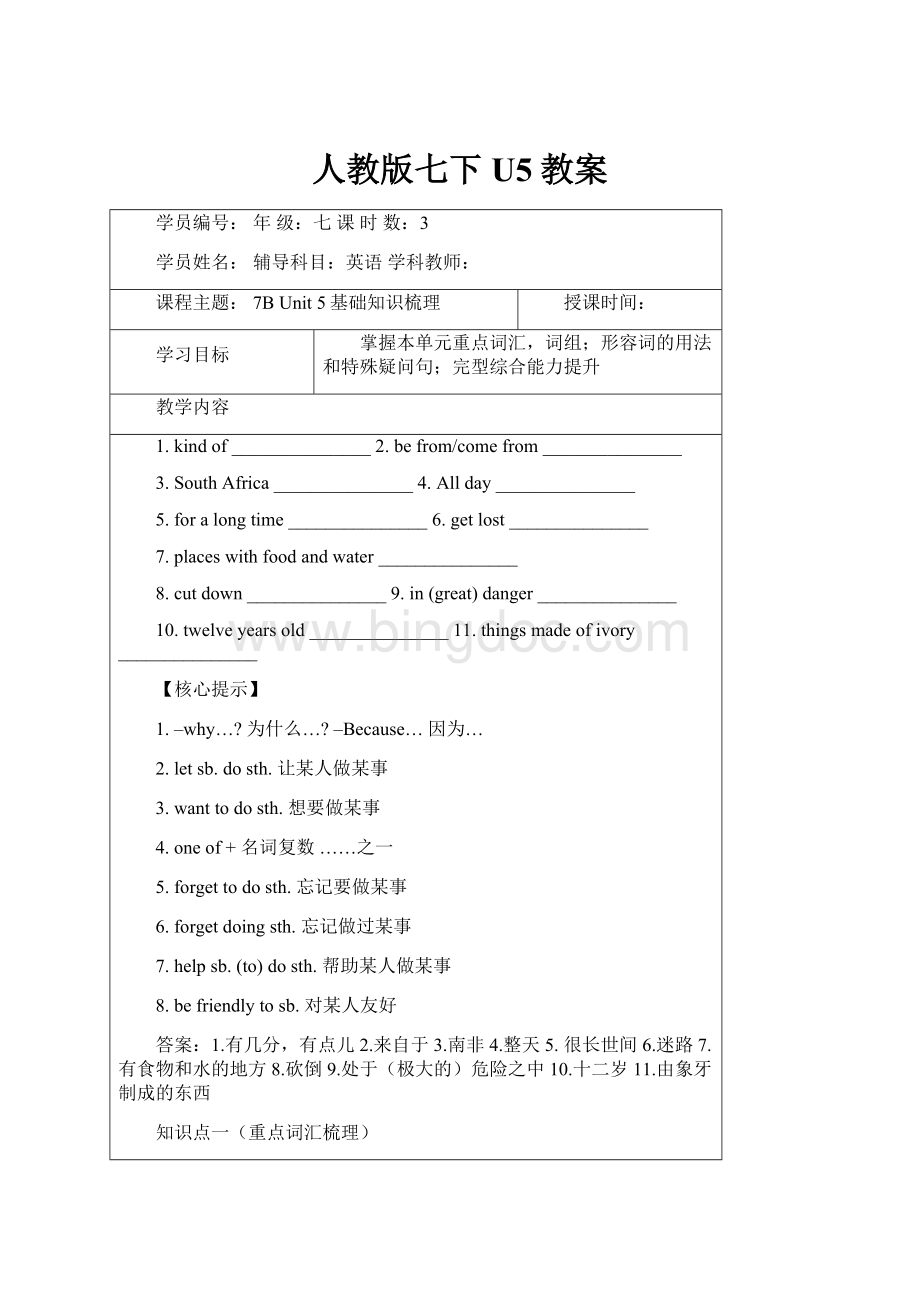人教版七下U5教案.docx
《人教版七下U5教案.docx》由会员分享,可在线阅读,更多相关《人教版七下U5教案.docx(18页珍藏版)》请在冰点文库上搜索。

人教版七下U5教案
学员编号:
年级:
七课时数:
3
学员姓名:
辅导科目:
英语学科教师:
课程主题:
7BUnit5基础知识梳理
授课时间:
学习目标
掌握本单元重点词汇,词组;形容词的用法和特殊疑问句;完型综合能力提升
教学内容
1.kindof_______________2.befrom/comefrom_______________
3.SouthAfrica_______________4.Allday_______________
5.foralongtime_______________6.getlost_______________
7.placeswithfoodandwater_______________
8.cutdown_______________9.in(great)danger_______________
10.twelveyearsold_______________11.thingsmadeofivory_______________
【核心提示】
1.–why…?
为什么…?
–Because…因为…
2.letsb.dosth.让某人做某事
3.wanttodosth.想要做某事
4.oneof+名词复数……之一
5.forgettodosth.忘记要做某事
6.forgetdoingsth.忘记做过某事
7.helpsb.(to)dosth.帮助某人做某事
8.befriendlytosb.对某人友好
答案:
1.有几分,有点儿2.来自于3.南非4.整天5.很长世间6.迷路7.有食物和水的地方8.砍倒9.处于(极大的)危险之中10.十二岁11.由象牙制成的东西
知识点一(重点词汇梳理)
【知识梳理】
1.Whydon’tyoulikethecat?
Whydon’tyou+动词原形+其他用来提出自己的建议或者征求对方的意见,意为“为什么不……呢”,相当于whynot+动词原形+其他
Whydon’tyou/Whynotaskhimforsomemoney?
[考点]Whydon’tdo=Whynotdo?
[扩展]提建议的表达方法
1)Shallwe…?
Shallwegotothepark?
2)Let’s…Let’sgohome.
3)Wouldyoulike…?
Wouldyouliketohavedinnerwithme?
4)What/Howaboutdoing…?
HowaboutgoingswimmingonSaturday?
5)You’dbetterdo…You’dbetterfinishyourhomeworkbysupper.
6)Willyoupleasedo…?
Willyoupleaseborrowmeyourbook?
7)Whynot/Whydon’tyou…?
Whynotasktheteacher?
对提建议的表达的回答,肯定的常用Goodidea./OK./Certainly./Sure等。
否定的常用Sorry./I’dloveto,but…等。
2.Becausetheyarekindofinteresting.
(1)kindn.种,类
akindof…一种……
allkindsof…各种各样……
Whatkindoftoysdoyoulike?
你什么哪种玩具?
Childrenlikethiskindofbooks.孩子们喜欢这种书。
(2)kindadj.善良的,仁慈的
It’ssokindofyoutohelpmewithmywork.你帮助我做工作,你真好。
(3)kindof表示“有点儿,有几分,相当”的意思,可以修饰动词、形容词和副词。
Theykindofliketheboy.他们有点喜欢那个男孩了。
I'mkindofhungry.我有些饿了。
(2)interestingadj.表示“有趣味的,引起好奇。
”作定语或表语。
Thisisaninterestingstorybookforchildren.这是一本有趣味的儿童故事书。
That'ssoundsinteresting.那听起来很有趣。
[扩展]
(1)interestedadj.感到有趣的
beinterestedinsth.对某事感兴趣
IaminterestedinEnglish.我对英语感兴趣.
(2)interestingadj.有趣的
Thebookisveryinteresting.这本书很有趣.
(3)interestn.兴趣
Hismaininterestsarereadingandplayingthepiano.他主要的兴趣是读书和弹钢琴.
(4)placeofinterest名胜古迹(复数变place)
Heknowsmanyplacesofinterest.他知道许多名胜古迹.
3.Helikesdogs,too.
(1)too用于形容词或副词之前,表示“太;过于”的意思
Hedrivestoofast.他开车太快了。
(2)表示“也”的意思
Ilikebananas,butIlikeoranges,too.我喜欢香蕉,可我也喜欢柑橘。
[扩展]too,also和either
这三个词都有“也”的意思,区别如下:
(1)also是比较正式的用语,语气较庄重。
它通常放在句中,位于行为动词之前,连系动词之后;如有助动词或情态动词,一般放在助动词或情态动词之后。
例如:
Peteralsohastwobrothers.彼得也有两个兄弟。
Iamalsoastudent.我也是一名学生。
Mrs.GreencanalsosingthesonginChinese.格林夫人也能用汉语唱这首歌。
(2)too是普通用词,多用于口语,语气较随便。
一般用在肯定句中,放在句末。
例如:
I'minRow1,too.我也在第一排。
注意:
also和too一般都用于肯定句。
(3)either表示“也”时,一般只用于否定句,且置于句末。
例如:
Idon'tknowhim.Tomdoesn'tknowhim,either.我不认识他,汤姆也不认识他。
Ifyoudon'tgothere,hewon'tgothere,either.如果你不去那儿,他也不会去那儿。
注意:
either本身没有否定的意义。
所以多与not连用。
4.TheelephantisoneofThailand’ssymbols. 大象是泰国的象征之一。
oneof 后接可数名词复数,表示什么中的一个,动词用单数第三人称。
如:
TheGreatWallisoneofthesightsoftheworld. 长城是世界名胜之一。
5.Elephantscanwalkforalongtimeandnevergetlost. 大象能够走很长的路,并且不会迷路。
(1)foralongtime 很长一段时间。
for介词,后面接表示“时间段”的名词。
I’mgoingawayforafewdays. 我要离开几天。
【提醒】at,on,in这些介词,后面接表示“时间点”的名词,不能接表示“时间段”的名词。
(2)getlost迷失,get是连系动词,lost是形容词,“迷失的;迷路的”,作表语。
Thebirdsflytothesouthinautumn.Buttheynevergetlost. 这些鸟儿在秋天长途飞行到南方。
但是它们从来不会迷失方向。
6.Theycanalsorememberplaceswithfoodandwater. 它们也能够记住有食物和水的地方。
with意思是“附加、附带着……”(表事物特征)。
如:
He’satallkidwithshorthair. 他是个长着一头短发的高个子小孩。
①带着,牵着……(表动作特征)。
Theyhavenomoneywiththem. 他们没带钱。
②表示“用……”,如:
Wecanwalkwithourlegsandfeet. 我们用腿脚行走。
③和……(某人)一起。
如:
Canyougotoamoviewithme?
你能和我一起去看电影吗?
④和play一起构成短语动词playwith, 意为“玩耍……,玩弄……”如:
Childrenliketoplaywithwater. 小孩爱玩水。
⑤与help
一起构成 help...with...句式,意为“帮助(某人)做(某事)”。
如:
KateoftenhelpsmewithmyEnglish. 凯特经常帮我学英语。
7.Butelephantsareingreatdanger. 但是大象处于极度危险当中。
indanger处于危险当中outofdanger脱离危险
Youwillbeindangerifyouwalkonarailwayline. 如果你在铁路轨道上行走那是很危险的。
8.Peoplesaythat“anelephantneverforgets”.
(1)forgettodosth.“忘记要做某事”,todo所表达的动作没有发生
Sheforgottocallme.她忘记给我打电话了。
(2)forgetdoingsth.“忘记做过某事”,某事已经做过了
Sheforgotcallingme,soshecalledmeagain.她忘记曾给我打过电话,所以又打了一回。
【例题精讲】
例1Let’sgoswimming.---________.
A.It’spleasureB.You’rewelcome.
C.Thanksalot.D.It’sagoodidea.
例2________doyoulovepandas?
----Becausetheyareverycute.
A.whatB.HowC.Why
例3Iamwritingtoyou________I’mafraidtotalkaboutitfacetoface.
A.becauseB.thoughC.until
例4同义句转换,没空一词
Mysisteriskindoflazy.
Mysisteris________________lazy.
例5Halfthedoctorsinthehospital________Beijing.
A.comesfromB.isfromC.befromD.comefrom
例6我爷爷通常很早睡觉。
Mygrandpaoften________________________veryearly.
例7Don’tworry,letmegiveyouahand.----Thankyou________.
A.lotsofB.alotC.manyD.much
例8________doyouspeakEnglishsowell?
BecauseIpracticeitwithmypartnereveryday.
A.WhyB.WhenC.WhoD.What
例9MoYanisoneof________writersintheworld.
A.famousB.morefamousC.mostfamousD.themostfamous
例10I’msorryI________myexercisebookathomethismorning.
Itdoesn’tmatter.Don’tforget________itherethisafternoon.
A.left;totakeB.forgot;bringingC.left;tobringD.forgot;tobring
例11Idon’thaveagoodsenseofdirections,soIeasily________.
A.getlostB.getawayC.gettogetherD.getahead
例12Meimeiisabeautifulgirl________bigeyesanddarkhair.
A.inB.onC.atD.with
例13Englishisnoteasy,________Ilikeitverymuch.
A.soB.ifC.but
例14Therewasatalltreeinfrontofmyhouse.Ihelpedmyfather________.
A.cutdownitB.cutthemdownC.cutitdownD.cutdownthem
例15Yoursisterdoesn’tgetupearly,doesshe?
---________.Butshegetsuplateonweekends.
A.No,shedoesn’t.B.Yes,shedoes.
C.No,shedoes.D.Yes,shedoesn’t.
答案:
1-5DCAalittle/bitD5-10goestobedBADC11-15ADCCB
【课堂练习】
1.________doyoulikeanimals?
---________theyareverycute.
A.Why;BecauseB.What;SoC.Why;SoD.What;Because
2.Tomisvery________.Henevercleanshisroom.
A.lazyB.activeC.smartD.healthy
3.Why________gotothezoowithus?
A.don’tB.notyouC.youdon’tD.not
4.Wheredoeshecome________?
----Beijing.
A.toB.forC.fromD./
5.---Doyouknowthattherearemanydifferent________animalsinthezoo?
---Yes,Ido.AndIalsoknowthatsomeofthemare________scaring.
A.kindsof;kindofB.kindsof;kindsof
C.kindof;kindsofD.kindof;kindof
6.Elephantsarenow________.
A.indangerousB.dangerC.indangerD.atdanger
7.Iliketables________ofwood.
A.makeB.madeC.makingD.makes
8.Pleasedon’tforget________himaboutthat.
A.tellB.tellingC.totellD.tells
9.Changjiangisoneofthelongest________intheworld.
A.riverB.riversC.lakeD.lakes
10.Don’t________trees.Theyaregoodforus.
A.cutdownB.thinkaboutC.listentoD.sayto
答案:
1-5AADCA6-10CBCBA
知识点二(语法)
【知识梳理】
一、形容词
形容词修饰名词,用以说明事物或人的性质和特征。
形容词是英语中最常用的一种词,它通常在句子中作定语、表语等。
1.作定语
这时的形容词用来修饰名词或代词放在名词或代词的前面。
如:
Thisisanoldbook.这是一本旧书。
2.作表语
形容词放在连系动词(be/feel/sound等)后,作表语,构成“主系表”结构,即“主语+系动词+表语”,说明主语是什么或怎么样,即说明主语的特性。
如:
Thegirlisbeautiful.这个女孩很漂亮。
Helookshappytoday.今天他看起来很高兴。
二、特殊疑问句
1.定义及答语
以特殊疑问词开头,对句中某一成分提问的句子叫特殊疑问句,其结构为:
特殊疑问词+一般疑问句。
不能用直接yes或no回答特殊疑问句,而要针对具体情况来作出回答。
2.特殊疑问词
特殊疑问词分为两类:
疑问代词和疑问副词,其用法归纳如下:
who
意为“谁”,对主语(人称代词)进行提问
whom
意为“谁”,对宾语(人称代词)进行提问
when
意为“何时”,对时间进行提问
where
意为“哪里”,对具体地点进行提问
how
意为“怎样”;如何,对方式进行提问
why
意为“为什么”,对原因进行提问
what
意为“什么”对某事物提问
which
意为“哪个;哪些”,对具体或特指
的事物进行提问
【注意】以why引导的特殊疑问句,一般要用because引导的从句来回答。
because是连词,作“因为”讲,其后要接一个句子来陈述理由、原因。
三.read,look,see,watch的辨析
read
强调看文字的材料,如:
看书,看报纸,看说明书,看地图等。
Shecan’treadmaps.
look
强调“看”的动作。
是不及物动词。
表示看具体的东西时,必须加介词at。
Pleaselookatthepicture.
see
强调“看”的结果。
意为“看见”,是及物动词。
Canyouseethatone?
watch
强调长时间,认真地看,意为“观看”,是及物动词。
WatchwhatIdo;thenyoutry.你注意看我的动作,然后试着做。
【例题精讲】
例1.Whydoyoulikeelephants?
---Becausetheyarevery________.
A.cuteB.boringC.scaryD.ugly
例2.Whatdoyouthinkofthisbook?
---It’s________interesting.
A.akindofB.kindsofC.kindofD.akind
例3.WhyisJohnso________toyou,Jean?
---Becausehewantsmetohelphim.
A.cleverB.beautifulC.smartD.friendly
例4.Where________thelionsfrom?
---SouthAfrica.
A.mayB.areC.doD.can
例5.Howmanyelephantsarethereinthezoo?
---Therearen’t________.
A.anyB.someC.oneD.much
例6.________doyoulikehamburgers?
---Becausetheyareverydelicious.
A.WhatB.HowC.WhyD.Where
例7.Koalasareverylazy.Theyusuallysleepand________20hourseveryday!
A.relaxesB.relaxedC.relaxingD.relax
答案:
1-7ACDBACD
【课堂练习】
从题中所给的A、B、C、D四个选项中选出一个最佳答案。
()26.Hecanplay______pianowell,butheplays_______tennisbadly.
A.the;theB.a;aC.a;theD.the;/
()27.Mrs.Whiteisgood______music.Shecanbegood______childreninthemusicclub.
A.at;atB.at;withC.with;atD.with;with
()28.---Jim,canyou______thiswordinChinese?
---Yes,Ican_____alittleChinese.
A.speak;sayB.say;speakC.tell;speakD.talk;say
()29.Jim____at6:
15inthemorningfromMondaytoFriday,buthegetsupalittlelate____.
A.usuallygetup;onweekendB.usuallygetsup;onweekends
C.getupusually;attheweekendsD.getsupusually;atweekends
()30.IhaveonlyoneticketofKungFu,so______you__